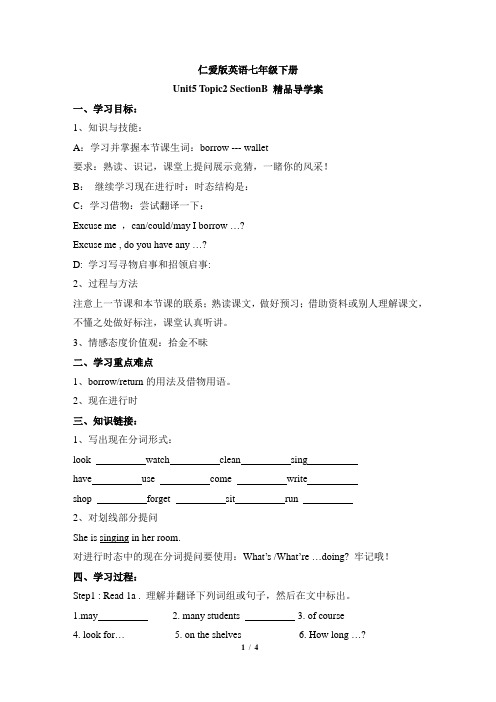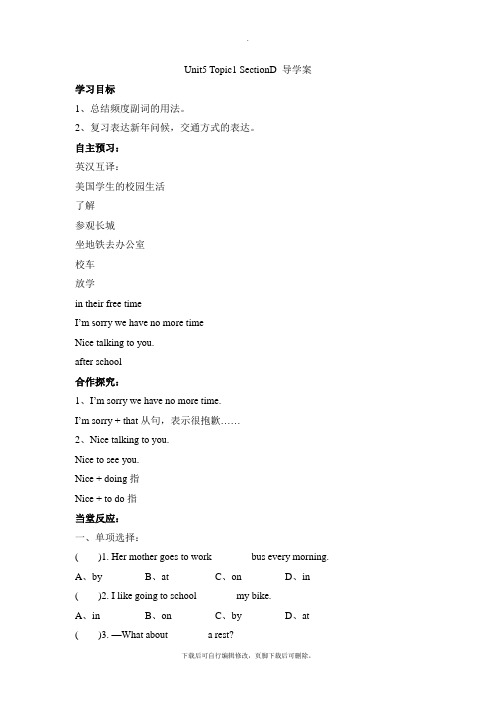最新仁爱英语七年级下册unit5 topic1 sectionB导学案
仁爱版英语七年级下册Unit5 topic 1 section A 教学设计

仁爱版英语七年级下册Unit5 topic 1 section A 教学设计一. 教材分析仁爱版英语七年级下册Unit5 topic 1 section A主要讲述的是关于日常生活中的问候和介绍。
通过本节课的学习,学生能够掌握基本的日常问候语和自我介绍的方式,提高他们的日常英语交际能力。
教材内容主要包括三个部分:热身活动、课堂活动和课后作业。
热身活动是通过简单的日常问候语来吸引学生的注意力;课堂活动分为三个部分,分别是学习日常问候语、学习介绍自己和练习对话;课后作业是让学生运用所学知识进行自我介绍。
二. 学情分析七年级的学生已经有了一定的英语基础,对于日常的问候语和自我介绍应该不陌生。
但是,对于如何运用这些问候语和自我介绍进行实际的交际,可能还有一定的困难。
因此,在教学过程中,需要注重学生的实际操作和练习。
三. 教学目标1.知识目标:学生能够掌握基本的日常问候语和自我介绍的方式。
2.能力目标:学生能够运用所学知识进行日常的英语交际。
3.情感目标:通过学习,学生能够增强对英语学习的兴趣和自信心。
四. 教学重难点1.重点:学生能够掌握基本的日常问候语和自我介绍的方式。
2.难点:学生能够运用所学知识进行日常的英语交际。
五. 教学方法采用任务型教学法,通过设定各种实际情境,让学生在实际操作中学习和掌握知识。
同时,运用分组讨论、角色扮演等教学手段,增加学生的参与度和积极性。
六. 教学准备1.教师准备:熟悉教材内容,了解学生情况,设定教学目标和方法。
2.学生准备:预习相关内容,了解日常问候语和自我介绍。
七. 教学过程1.导入(5分钟):通过简单的日常问候语来吸引学生的注意力,引导学生进入学习状态。
2.呈现(10分钟):教师展示教材中的对话,引导学生跟读和模仿,让学生初步掌握日常问候语和自我介绍。
3.操练(10分钟):学生分成小组,进行角色扮演,模拟实际情境,运用所学知识进行英语交际。
教师巡回指导,纠正发音和语法错误。
仁爱版英语七年级下册Unit5_Topic2_SectionB_导学案

仁爱版英语七年级下册Unit5 Topic2 SectionB 精品导学案一、学习目标:1、知识与技能:A:学习并掌握本节课生词:borrow --- wallet要求:熟读、识记,课堂上提问展示竞猜,一睹你的风采!B:继续学习现在进行时:时态结构是:_____________________________C:学习借物:尝试翻译一下:Excuse me ,can/could/may I borrow …?Excuse me , do you have any …?D: 学习写寻物启事和招领启事:2、过程与方法注意上一节课和本节课的联系;熟读课文,做好预习;借助资料或别人理解课文,不懂之处做好标注,课堂认真听讲。
3、情感态度价值观:拾金不昧二、学习重点难点1、borrow/return的用法及借物用语。
2、现在进行时三、知识链接:1、写出现在分词形式:look watch clean singhave use come writeshop forget sit run2、对划线部分提问She is singing in her room.对进行时态中的现在分词提问要使用:What’s /What’re …doing? 牢记哦!四、学习过程:Step1 : Read 1a . 理解并翻译下列词组或句子,然后在文中标出。
1.may2. many students ___3. of course_____________4. look for…__________5. on the shelves___________6. How long …? _________7. two weeks_____________ 8. on time _________9. return=give…back___________10. return sth to …= give sth back to …__________11. Excuse me, may I borrow ….?12. How long can I keep them ?13. You must return them on time . ____________15. Thank you all the same != Thank you anyway .Step2 .Read 1a again ,answer the four questions below (根据1a回答问题) 1.What does Li Ming want to borrow?______________________________________2.How long can he keep them?______________________________________Step 3 . Read 1a after the record, and then act it out with your partner.Step 4 . Complete 1b and 1cStep 5 . Listen to the record about 2a and complete the conversation:Read 2a again and practice it.Step 6: Complete 2cNotes: LOST (寻物启事);FOUND (认领启事)五、学法指导:1、识记单词,熟读课文2、学用工具3、小组合作4、学会虚心倾听,学会上课专注。
仁爱版英语七年级下册7B Unit5_Topic1_SectionC_精品导学案

Unit5 Topic1 SectionC 导学案学习目标A:学习并掌握本节课生词:begin-twiceB:学习频度副词组:every day ___________; every week______________;every Sunday _____________; once a week 一周一次;twice a week _____________________;three times a year_________________ ;very often ________________★★★对以上词组提问用how often …? 一定要记牢哦!C:能够运用频度副词谈论日常生活:How often do you come to the library?Three times a week.重难点:运用频度副词谈论日常生活。
自主交流英汉互译:起床__________ 去上学__________ 上课__________踢足球__________ 回家__________ 看电视__________做作业__________ 去睡觉__________meet friends__________ listen to TV__________read books__________ once a week____________________ three times a week____________________after school____________________合作探究一、Read 1a. 理解并掌握下列短语,然后在文中标出。
1. get home 意为“到家”。
home 是副词,get 后接副词时不带to。
而“get to+地点名词”意为“到达某地”。
例:到校____________ 到图书馆_____________2. begin 开始、着手begin to do sth.或begin doing sth.开始做某事。
仁爱版英语七年级下册Unit 5 Topic 1 Section B优质课课件

H: get up, on weekdays M: 6:00 H: early bird; how, go to school M: usually, on foot H: seldom, walk; often, by subway S: never, by subway; always, take a bus
C: My father always goes to work by subway. D: He seldom goes to work by train. E: Sometimes I come to school by bike. …
weekdays
walk watch TV play soccer/football see abird movie do one’s worm homework
What time do you usually get up? A: I usually get up at half past six. B: I usually get up at six. C: … We should go to bed early and get up early. As the saying goes, “____________________________ The early bird catches the worm .”
Listen to 1a and complete the sentences with usually, always, often, sometimes, seldom, or never. • 1. Michael ________ usually walks to school but __________ sometimes goes by bike. • 2. Helen ________ seldom goes to school on foot. She _________ takes the underground. often • 3. Sally ________ never takes the underground. She ________ always goes to school by bus.
仁爱版英语七年级下册 Unit5 Topic1 SectionD 精品导学案

Unit5 Topic1 SectionD 导学案学习目标1、总结频度副词的用法。
2、复习表达新年问候,交通方式的表达。
自主预习:英汉互译:美国学生的校园生活________________了解________________参观长城________________坐地铁去办公室________________校车________________放学________________in their free time ________________I’m sorry we have no more time ________________Nice talking to you. ________________after school ________________合作探究:1、I’m sorry we have no more time.I’m sorry + that从句,表示很抱歉……2、Nice talking to you.Nice to see you.Nice + doing指____________________Nice + to do指____________________当堂反应:一、单项选择:( )1. Her mother goes to work _______ bus every morning.A、byB、atC、onD、in ( )2. I like going to school _______ my bike.A、inB、onC、byD、at ( )3. —What about _______ a rest?—OK! Let’s go fo r a walk.A、to haveB、hadC、haveD、having二、按照要求转换以下各句:1、Sue goes home twice a week.(对划线局部提问)__________ __________ does Sue go home?2、Linda seldom walks to school on weekdays.(改为一般疑问句)__________ Linda seldom __________ to school on weekdays?3、Tom rides a bike to school every day.(改为同义句)Tom __________ to school __________ bike every day.4、Lily goes to bed at eleven in the evening.(改为否认句)Lucy __________ __________ to bed at eleven in the evening.5、David sometimes goes home by subway.(改为同义句)David sometimes __________ __________ subway home.拓展提升:Survey your classmates about their school lifeWrite a passage.You may begin like this:The school like of American students is different from ours…自我评价_____________________________________________________________________ _____________________________________________________________________。
仁爱英语七年级下Unit 5 Topic 1 Section A.B

1a Look, listen and say.
1.—Happy New Year! —The same to you. 2.—Do you often come to school by bike? —Yes, I do.
3.—How do you usually come to school? —I usually come to school by subway. 4.—It’s time for class.
2a. Study the example to understand the two ways of expressing the same meaning. Then fill in the blanks.
1a. Look, listen and say.
H: get up, on weekdays M: 6:00 H: early bird; how, go to school M: usually, on foot H: seldom, walk; often, by subway S: never, by subway; always, take a bus
for 4.—It’s time ___class.
We learn: 1. some words: gate, plane, train, ship, boat, by, always 2. some phrases: come on, on foot, by bike/car/bus/train/subway/plane/boat 3. some sentences: How do you usually come to school? I usually come to school by subway. We can: talk about the means of transportation. e.g. I often go to school by bike/bus.
仁爱版七年英语下册Unit5 Topic1 Section D教案

课题Unit5 Topic1S e c t i o n D备课时间 2.24 授课时间 3.5教学目标知识与技能总结频度副词结合一般现在时实意动词的用法;过程与方法能写出表达交通方式和频度的简单句子;能写出叙述学校生活的篇章。
情感态度价值观通过了解他人的校园生活培养关心他人的意识。
教学重点总结频度副词结合一般现在时实意动词的用法教学难点将本话题学到的关于学校生活、交通方式、频度等知识用文段进行信息的输出。
教学方法Co-op eration学习方法Task-based课型writing教学过程Step Intera ctionpatternStudent activity Teacher activityIntroduction (5 minutes) 1.The wholeclass work.2.Individualwork and pairwork.1.Focus their attention on theteacher.2.Do duty report. Draw yourdaily activities form similar to1a in Section C. Then talkwith your partner about yourday with the help of the form.Some students report yourpassages to the class.1.Get studentsready for learning.2.Help the studentsto expresscorrectly. And helpthem revise SectionC at the same time.Presentation (10 minutes) 1.Individualwork and thewhole classwork.1.Read through Sections A~C.Do brainstorming. Try to saythe adverbs of frequency andthe means of transportation1.Help the studentsrevise the grammarin this section.2.Individual work and pair work. you have learned. Learn“Grammar”, adverbs offrequency, in P7.2.Look at the sentences on theblackboard which are shownby the teacher. Find out themistakes and try to correctthem by yourself. Then checkyour answers with yourpartner. Discuss together.2.Let the studentsfind and corr ect themistakes insentences bythemselves. Theteacher may warnthem not to makethe same mistakesnext time.Consolidation (10 minutes) 1.The wholeclass workand pairwork.1.Answer the teacher’squestions in “Functions”.Then act in pairs. Prepare aconversation, using new yeargreetings, adverbs offrequency, the means oftransportation and so on. Thenpractice in pairs. Some pairsact it out to the whole class.1.Help the studentsto consolidate thewords andexpressions bymaking andpracticingconversations.Practice (10 minutes) 1.Individualwork, pairwork and thewhole classwork.1.Do Task 1. Read thesentences in Task 1. Guess theanswers before listenin g.Then listen to the tape and fillin the blanks. Check withyour partner. Listen again andthe whole class read after thet ape.1.Play the taperecorder. Check theanswers.2.Individual work, pair work and the whole class work.3.Pair work. 2.Do Task 2. Get somebackground information fromthe teacher. Look at thepicture in P8. Try to guesswhat kinds of questions maybe asked in the interview.Then read the interview andanswer the questions. Discussyour answers with yourpartner. Then the whole classcheck the answers together.3.Practice the interview inpairs, one is the interviewerand the other is Michael. Youcan use facial expressions andgestures to make it easier foryour classmates to understandyou.2.Help the studentslearn to predictbefore reading.Check the answers.3.Help the studentsexpress correctly.Production (10 minutes) 1.Groupwork.1.Sit in groups of four. Do asurvey. Survey y ourclassmates about their sch oollife, including how to go toschool, where to have lunch,when to leave school, what todo after school, how oftendoes he/she ... Then comparethe school life of Am ericanstudent s with yours andreport it to the class orally.1.Help the studentsto practice theirspoken English.作业布置Review the words and expressions in this Section.Complete the Exercise Book;Write a passage to compare the school life of American students withours.Preview Topic 2, Section A.课前二次备课梳理课后反思。
【推荐】仁爱英语七年级下册导学案Unit5-Unit8全集(完整详细版)[1]
![【推荐】仁爱英语七年级下册导学案Unit5-Unit8全集(完整详细版)[1]](https://img.taocdn.com/s3/m/099b2747cc175527072208a3.png)
仁爱英语七年级下册导学案Unit5- Unit8合集一、学习目标:1、知识与技能:A:学习并掌握本节课生词:gate---group . 通过预习达到会读、识记要求,上课时默写,要求在听写本上做好准备,标清序号(15个),条理清晰,每行4个,成绩计入个人周成绩表。
只要你肯下决心并付诸行动,你一定会赢在起跑线上的!B:学习频度副词:如usually(通常),你在P1 还能够找到两个,试一试:____________(经常);______________(总是)C:学习交通方式的表达法:骑自行车:by bike ;你来试一试:乘火车_______________乘飞机_______________乘地铁_______________乘轮船_______________乘小船_______________乘公交_______________乘小轿车_______________特别注意!:步行_______________ (可以参考课本P2)以上词组要求熟背,课堂上个人,小组进行竞赛展示,期望你是最棒的!更期望你是小组的骄傲!D:能够用一般现在时谈论交通方式,尝试翻译:How do you usually come to school ?____________________________?I usually come to school by bus . _______________________________康康总是怎样回家的?______________________________________?2、过程与方法课前做好预习,预习中做好预测,标出不会的内容,寻求同桌、小组帮忙,聆听别人的见解,专注于老师的总结。
3、情感态度价值观:(1)随着社会经济的发展,人们的生活水平和生活质量越来越高,各种交通工具开始进入人们的日常生活,我们要学会珍惜,学会感恩,更要学会创造!(2)交通安全时时刻刻要牢记!二、重点难点他总是步行回家。
- 1、下载文档前请自行甄别文档内容的完整性,平台不提供额外的编辑、内容补充、找答案等附加服务。
- 2、"仅部分预览"的文档,不可在线预览部分如存在完整性等问题,可反馈申请退款(可完整预览的文档不适用该条件!)。
- 3、如文档侵犯您的权益,请联系客服反馈,我们会尽快为您处理(人工客服工作时间:9:00-18:30)。
1
Unit 5 Our School life
Topic 1 How do you usually come to school?
Section B
学习目标:
(1)学习并掌握本节课生词:weekday --- movie及频度副词:always(总是),usually(通常), often(经常),
sometimes(有时),seldom(很少),never(从不)。
(2)学习交通方式的动词词组表达法,如:take the train(坐火车),take the subway(坐地铁),
take the plane(坐飞机),take the bus(坐公交车), take a car(做小汽车), ride a /one’s bike. (骑自行车),
学习重点:
1、频度副词总结 2、交通方式的动词表达方式及于介词表达方式的转换
课前预习:
1.频度副词总结:always(总是)--usually(通常) --often(经常)--sometimes(有时)--
seldom(很少)--never(从不)表示频率的从高至低。
★★★ 对以上频率副词提问,使用:How often ….? 牢记哦!
2.交通方式的动词表达方式及于介词表达方式的转换,如:
go to +地点+on foot= walk to +地点 走路去… 如:
I often go to school on foot. =I often walk to school.
go to +地点+by bike = ride a bike to +地点 骑车去… 如:
He usually goes to work by bike. = He usually rides a bike to work.
go to +地点+by car = drive a car to +地点+ 开车去… 如:
He sometimes goes to Beijing by car. = He sometimes drives a car to Beijing.
go to +地点+by plane = fly to…坐飞机去… 如:
He always goes to Canada by plane. = He always flies to Canada.
go to +地点+by bus = take a bus to…坐公交车去… 如:
I never go home by bus = I never take the bus home
3. The early bird catches the worm . 早起的鸟儿有虫吃。
学习流程:
1、分别使用介词和动词翻译下列词组:
骑自行车 by bike , ride a bike 乘公交 ,
乘地铁 , 乘火车 ,
乘飞机 , 乘轮船 ,
乘小船 , 步 行 ,
2
4.看1a视频,回答下列问题。
(1) What time does Michael usually get up on weekdays? _____________________________________
(2) How does he usually come to school? ____________________________________________
(3) What about Helen?_________________________________________________________________
(4) And Sally? _________________________________________________________________________
5.自读1a,翻译下列句子。
(1)你通常在工作日什么时候起床?_____________________________________________________
(2)我通常走路上学,但有时骑自行车。_____________________________________________________
(3)Mike经常坐飞机去Shanghai,但有时坐火车______________________________________________
(4)我很少走路上学。______________________________________________________________
(5)她爸爸从不坐地铁上班。_______________________________________________________________
(一)根据汉语意思和句意写出单词
1. What do you usually do on ____________(工作日)?
2. The early bird _____________(捉住) the worm .
3. Mary often ____________(骑) her bike to school .
4. Jim often gets up _____________(早地) to catch the bus .
5. I ______________(很少)watch TV on weekdays .
(二)单项选择
( )1. I don’t want ______ so early .
A. to get up B. gets up C. get up D. getting up
( )2. My father never _____.
A. cooks B. cook C. cooking D. is cooking
( )3. Will you get there by ____ train ? No, I’ll take ______ taxi (出租车)
A. / a B. a / the C. / / D. the / a
( )4. Does your mother get up early every day ? _________.
A. Yes, she does B. No, she does C. Yes, she do D. No, she don’t .
( )5.Xiao Ming never _____ home on foot . She often takes the subway .
A. go to B. goes to C. walks D. goes .
(三)同义句转换
1. I usually take a bus to school == _________________________________________ _
2. He often takes a plane to Beijing .==__________________________________________
3. we always take the subway to work .== __________________________________________
4. Michael sometimes rides a bike home .== __________________________________________
5. Jane seldom walks to his office == __________________________________________
6. Helen never drives a car to the Great Wall . ==__________________________________________
